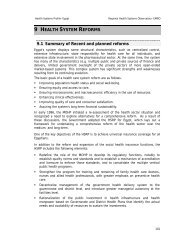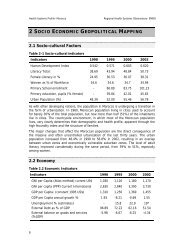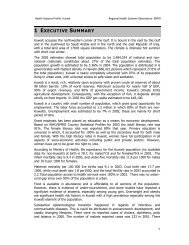The role of contractual arrangements in improving health sector ...
The role of contractual arrangements in improving health sector ...
The role of contractual arrangements in improving health sector ...
You also want an ePaper? Increase the reach of your titles
YUMPU automatically turns print PDFs into web optimized ePapers that Google loves.
Jordan<br />
• Enhanc<strong>in</strong>g equity by referr<strong>in</strong>g <strong>in</strong>sured patients to other <strong>sector</strong>s <strong>in</strong> order to provide<br />
access to the M<strong>in</strong>istry <strong>of</strong> Health services for poor and disadvantaged people who<br />
cannot afford treatment cost <strong>in</strong> private hospitals.<br />
• Tak<strong>in</strong>g <strong>in</strong>to consideration the high unemployment rate (16%) and the high<br />
percentage (12%) <strong>of</strong> people below the poverty l<strong>in</strong>e, contract<strong>in</strong>g out <strong>health</strong><br />
services is becom<strong>in</strong>g a social policy tool <strong>in</strong> Jordan.<br />
• Conta<strong>in</strong><strong>in</strong>g <strong>health</strong> costs by us<strong>in</strong>g underutilized hospital beds <strong>in</strong> private and other<br />
public <strong>sector</strong>s, <strong>in</strong>stead <strong>of</strong> <strong>in</strong>vest<strong>in</strong>g <strong>in</strong> build<strong>in</strong>g new hospitals.<br />
• Provid<strong>in</strong>g <strong>in</strong>centives for private hospitals to stay <strong>in</strong> the bus<strong>in</strong>ess and develop their<br />
services to attract more patients from other countries. This will have a positive<br />
impact on macroeconomic level and <strong>in</strong>crease the national <strong>in</strong>come from “medical<br />
tourism” which was about JD 400 million <strong>in</strong> 2002.<br />
• Reliev<strong>in</strong>g the M<strong>in</strong>istry <strong>of</strong> Health <strong>of</strong> the provision <strong>of</strong> some highly specialized<br />
medical services that require costly <strong>in</strong>vestment <strong>of</strong> capital and human resources.<br />
This will allow the M<strong>in</strong>istry <strong>of</strong> Health to divert resources, develop and extend<br />
primary <strong>health</strong> care services.<br />
• Chang<strong>in</strong>g the negative <strong>role</strong> <strong>of</strong> the government towards private hospitals to a more<br />
positive and supportive <strong>role</strong>. Instead <strong>of</strong> buy<strong>in</strong>g the bankrupt private hospitals (e.g.<br />
Queen Alia Hospital <strong>in</strong> Amman, Al-Nadim Hospital <strong>in</strong> Madaba, and the Specialty<br />
Hospital <strong>in</strong> Mafraq) the government policy now encourages purchas<strong>in</strong>g services<br />
from private hospitals to help them prosper and stay <strong>in</strong> bus<strong>in</strong>ess.<br />
• Build<strong>in</strong>g partnership between the public and private <strong>sector</strong>s based on serv<strong>in</strong>g<br />
mutual <strong>in</strong>terests <strong>of</strong> both parties.<br />
Reasons for the private <strong>sector</strong> to enter <strong>in</strong>to <strong>contractual</strong> <strong>arrangements</strong> with the<br />
M<strong>in</strong>istry <strong>of</strong> Health <strong>in</strong>clude the follow<strong>in</strong>g.<br />
• Fully utiliz<strong>in</strong>g the bed capacity (1905 beds) and the advanced diagnostic<br />
technology <strong>in</strong> private hospitals <strong>in</strong> order to achieve better return for <strong>in</strong>vestment<br />
and <strong>in</strong>crease net pr<strong>of</strong>it.<br />
• Ensur<strong>in</strong>g regular cashflow to meet recurrent hospital expenses.<br />
• Strengthen<strong>in</strong>g the competitive situation <strong>of</strong> the private hospital. It is considered as<br />
government accreditation.<br />
• Secur<strong>in</strong>g a stable and cont<strong>in</strong>uous revenue. Contract<strong>in</strong>g with the public <strong>sector</strong><br />
<strong>in</strong>creases the revenue mix <strong>of</strong> the private hospitals and safeguards them aga<strong>in</strong>st<br />
economic fluctuation.<br />
Political and legal environment<br />
Jordan began adopt<strong>in</strong>g a liberal economic policy as early as 1985 based on the<br />
redef<strong>in</strong>ition <strong>of</strong> the <strong>role</strong>s <strong>of</strong> the government and the private <strong>sector</strong>. <strong>The</strong> primary<br />
responsibility is be<strong>in</strong>g assigned to the government for supervision, follow-up,<br />
regulation, safeguard<strong>in</strong>g rights and ensur<strong>in</strong>g equality <strong>of</strong> opportunities and<br />
competition. In 1996, the Jordanian privatization programme was <strong>of</strong>ficially<br />
announced. <strong>The</strong> ma<strong>in</strong> objectives <strong>of</strong> the programme were: attract<strong>in</strong>g private<br />
<strong>in</strong>vestment; improv<strong>in</strong>g the efficiency <strong>of</strong> enterprise; and develop<strong>in</strong>g the local market to<br />
118
















